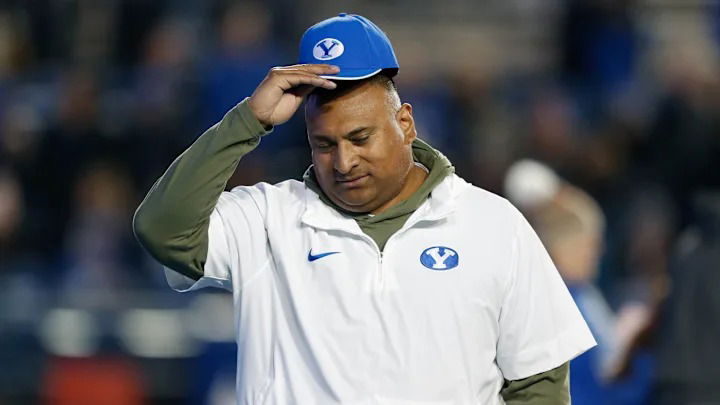

The hottest topic in the ongoing spring meetings is the playoff bracket. Last season’s 12-team playoff was the first edition of the format. And as expected, it went down with controversy. Critics argue that more deserving teams were not included in the final list. That includes programs like Alabama and Ole Miss, who finished just short of the cut-off mark. Instead, underdog programs like Indiana and SMU earned themselves a spot that not many were happy about. As commissioners of various conferences argue for their problems, one head coach is vocalizing his support for his boss after barely making the playoffs last year.
Watch What’s Trending Now!
BYU and SMU finished with the records of 11-2 and 11-3 last season. And yet, it was the Mustangs who made it into the final 12. Kalani Sitake, who led the Cougars in what can be called his career-best season, finished at No. 17. Moreover, the Cougars beat SMU at the beginning of their season. Calls for a revision of the playoff bracket and its criteria grew rapidly and are now the most important topic being debated by conference heads. It is also the one thing that has the Power 4 divided into groups of 2. The SEC and the Big 10 are pushing for a 4-4-2-2-1 format. The Big 12 and the ACC, on the other hand, are batting for a 5+11 format.
Sitake is extending his full support to Big 12 commissioner Brett Yormark. He said in a May 31 video of KSL Sports, “I think for me, it makes sense to go 5 and 11… I agree with our commissioner. And I think we’re all, I mean, like I said before, you’ve heard me say this before, I’ll follow Commissioner Yormark’s leadership.”
ADVERTISEMENT
Here’s how the format works. Champions of the 5 conferences get an automatic qualifying bid, while the 11 remaining are at-large bids. Sitake thinks the format allows for more competition. “[The] more I educate myself on it, the more I realize that the best way to do it is handle it, and basically handle it on the field and allow the teams to compete,” he said.
“I think this format, though allows it the flexibility for every year and different types of, I mean, some conferences will have a better year, have more strength in the conference. And this one kind of, I think, covers all bases for you and we’ll get down to the best teams and allow them to compete for it,” Sitake added.
The debate around fairness in the playoff list last year caught lots of traction. BYU was the only team to beat SMU, and that too on the road. Quality-wise, the Cougars’ schedule is likened to that of Texas. And yet, Indiana, with a schedule that ranked 103in difficulty, made it to the playoffs.
ADVERTISEMENT
The Big 12 does not have it easy when it comes to the playoff race. Towards the tail end of the season, BYU and ASU were its two best bets to the final 12. However, the Cougars doomed themselves out of playoff contention when they lost to Arizona State. Amidst these heated discussions for playoff revisions, Yormark is hitting back at the SEC’s Greg Sankey.
Top Stories
Patrick Mahomes’ Dad Faces 10-Year Prison Sentence After Chiefs QB’s Father Reportedly Violated Probation Terms

Prayers Pour In From Jordan Love & Co. as Cowboys Star Mourns Tragic Personal Loss

Justin Jefferson Makes Final Decision on Joining Buffalo Bills After Further Damaging J.J. McCarthy Relationship

Matthew Stafford Makes Final Decision on Retirement After Narrowly Beating Drake Maye For NFL MVP

Multiple PGA Tour Pros Stopped from Playing as WM Phoenix Open Round Is Canceled Over Recurring Problem

PGA Tour Split Into Two as Scottie Scheffler Confirms Stance on Patrick Reed’s Return

ADVERTISEMENT
Brett Yormark fires back at Greg Sankey about playoff expansion
Sankey told the press that he didn’t want “lectures from others about the good of the game.” Those others included the leaders of his fellow commissioners. To that, Yormark fired back by saying, “[The] Big Ten and SEC are leading the discussions, but with leading those discussions, they have a great responsibility that goes with it, to do what’s right for college football and not to do anything that just benefits two conferences.” The two conferences have long been accused of establishing a bias among the CFP committee because of their dominance. Because, with time, the ACC and the Big 12 are now finding it extremely difficult to continue.
The 5+11 model would end up giving the Big 12 just one automatic bid rather than two. But Yormark still lobbies for it. “The 5+11 might not be ideal for the conference, but it’s good for college football and it’s what’s fair,” he said. “And we don’t want any gimmees. We want to earn it on the field, and that was the direction of the key stakeholder group, the ADs and the coaches, and I feel comfortable with that,” Yormark added further.
The battle for a ‘fair’ version of playoffs saw the scrapping of the 4-team format. Now, even the 12-team format could not escape the allegations of bias. What is the ideal format that can finally see people clamoring for fairness quiet down in unison? Can the 5+11 format truly bring more fairness to the sport?
ADVERTISEMENT
ADVERTISEMENT
ADVERTISEMENT
ADVERTISEMENT
.png)
.png)
.png)



